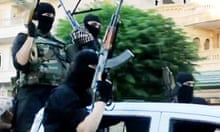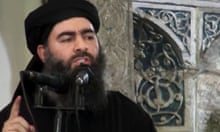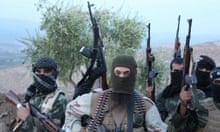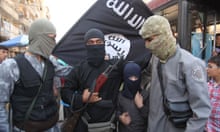In the grounds of Archbishop Bashar Warda's cathedral, the last Christians of northern Iraq are trying to find shelter. Some huddle under parched shrubs. Others move in sync with the shadow from the church office that gives them a reprieve from the baking sun. Children and women mill around a makeshift food hall, while old men stare vacantly. There are 4,000 desperate souls in the church grounds. And all seem shocked to be here.
Inside, the archbishop is reflecting on a week that has all but ended coexistence in Iraq's Arab north-west. A multi-ethnic and religious understanding that had prevailed throughout millenniums of war and insurrection could not withstand the latest purge, led by the ruthless jihadists of the Islamic State (formerly Isis) that rampaged through the area over the last week.
"We did not expect that one day Mosul would be without Christians and that the Nineveh plains would be emptied of minorities," Warda said of the stretch of land surrounding Mosul that had been hailed throughout the ages as a cradle of civilisation. "Trust is broken between the communities. Especially with the Arabs. For 2,000 years, all these minorities had lived together."
Gesturing outside his window where the human detritus of war lingered, he said: "These people could tell you they have had neighbours for 40 years who were the first to steal from their homes and celebrate the arrival [of Isis]."
Until last Wednesday, roughly 70,000 Christians remained in Mosul and Nineveh, along with up to 200,000 Yezidis, Shabbak Shias and Turkmen. Almost all have now fled, with the exception of up to 40,000 Yezidis marooned on a mountaintop near the city of Sinjar that had been home to the sect for several thousand years.
Food and water has been slowly reaching the Yezidis in recent days. But with Isis fighters encircling them below, they have no way down the mountain. According to the Yezidi community, scores of people, among them children, have died there since Sinjar was overrun by the jihadists last Sunday.
While less dire in terms of physical suffering, the fate of Nineveh's Christians is equally bleak: the Chaldean diocese in Irbil said that just 30-35 Christians remained in the town of Qaraqosh that until Thursday was home to 50,000 – the largest Christian urban centre in Iraq.
"There are maybe one or two in Qaramless," the archbishop said. "And none that we know of in Mosul. This is the end," he said.
"Some might be able to go back eventually, but how to rebuild that trust is a very big problem. We expected some sort of serious crisis like this, because we were in a position to know that Isis were taking so much money from the people of Mosul. And recently we were informed that certain people were sacked from their jobs just for being Christian."
Isis members had earlier this month given Mosul's Christian community an ultimatum to pay $10,000 in tax to retain their faith and homes, or alternatively 48 hours in which to flee. Those who chose neither faced death.
"They think they have the right from God to give orders," said Archbishop Warda. "There is no negotiating with them."
While Mosul's Christians rushed for the safety of Irbil, communities between both cities largely stayed put, believing that Kurdish forces deployed to their areas would keep the militants at bay. But Kurdish forces capitulated, first in Sinjar last Sunday and then around the Christian towns early last Thursday. Officers and troops claimed, at the time, to have been outgunned by the jihadists who were wielding heavy weapons from the Iraqi army's main arsenals when it had abandoned its posts during the initial Isis push on 10 June.
After one of the most extraordinary routs in modern military history, the peshmerga stepped in to fill the vacuum in much of north-western Iraq. But they, too, have been routed, raising fears that even Irbil may not be safe from the battle-hardened ideologues now little more than 50km away.
John Matte Hana, 30, said he was the guard at a church in the town of Bartella, 60km from Irbil, until Isis forces arrived. He stayed because he felt safe with the Kurds nearby. "We did not flee from Bartella initially because we were told that peshmerga were in charge and they were strong," he said. "Now we want to go to Europe. We can't live here any more."
Abu al-Fida, a teacher from Mosul who was sleeping rough with his family in the churchyard, said: "Are my children going to remember these days, living like beggars like this, in gardens, unfinished buildings, or on the streets? Are they even going to remember that we had a house and a life in Mosul?
"Our grandfathers a century ago were killed by the Turks. Those days have returned. The only solution for us is a Kosovo deal," he added, referring to the internationally brokered deal to bring an end to fighting between the Serbian and Albanian communities in the Balkan state.
Along the highway west of Irbil towards the frontline town of Khazer, peshmerga forces and volunteers reported hearing the sounds of jet fighters somewhere in the hazy summer sky, but no explosionson Saturday.
Near Khazer and around the Mosul dam to the north, around 150 peshmerga troops and officers have been killed in the past few days, officials in Irbil said. Up to 500 others have been wounded, so far for little gain.
The Kurds have lost control of the Mosul dam, a vital waterway and cog in Iraq's hydro-electricity generating capacity. Isis seized the site on Friday, Kurdish and American officials acknowledged, in what is one of the most serious strategic losses anywhere in Iraq since the insurrection began in June.
One peshmerga soldier, Ayub Risha, 35, who was deployed to the frontline on Friday, said: "Since last night, Isis positions have been quiet. They are not far from us. We heard the planes today, but they did not bomb."
Despite the lull, in Irbil the proximity of war is proving unsettling to the more than 1.2 million exiles who are now seeking refuge. Non-Christian Arab Iraqis who have lived or have moved to the Kurdish north are facing far more scrutiny. Those who are found with a weapon in their homes are arrested and jailed, on suspicion of being a stalking horse for the jihadists across the barren ranges.
"It is not a good time to be an Arab in the Kurdish area," said one Sunni man from Baghdad, who was too afraid to reveal his identity. "It is not a good time to be an Iraqi."










